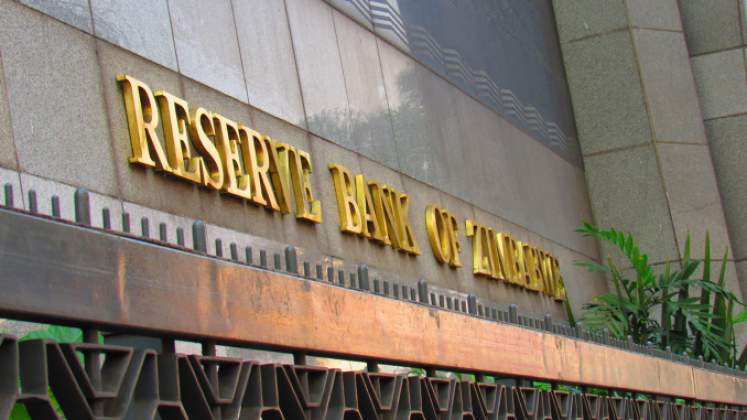
[ad_1]
BY KUDZAI KUWAZA/TATIRA ZWINOIRA
THE Reserve Bank of Zimbabwe (RBZ) yesterday named individuals which it accuses of facilitating illegal foreign currency transactions and money-laundering activities in the country, and forwarded their names to law enforcement agencies for prosecution.
Some of the accused individuals were Rangarirai Guzha, Winston Guzha, Lloyd Mbonga, Rodrick Njiva, Nixon Murwira, Kudakwashe Hove, Admire Sithole, Pariet Kadembo and Evans Mutsakanyi.
The move by the central bank comes barely two months after it exposed “outliers” including listed milling giant, National Foods, which it said were “abusing” foreign currency acquired through the auction system.
In June this year, RBZ named 18 companies which allegedly abused the foreign currency auction system under Statutory Instrument (SI) 127 of 2021.
In a statement yesterday, RBZ said the named persons had been facilitating illegal foreign exchange transactions and money-laundering activities, hence their accounts should be frozen.
They will, therefore, be banned from accessing financial services for two years.
- Chamisa under fire over US$120K donation
- Mavhunga puts DeMbare into Chibuku quarterfinals
- Pension funds bet on Cabora Bassa oilfields
- Councils defy govt fire tender directive
Keep Reading
The move intends to curb the growing disparities between the official and parallel forex rates of US$1:$86 and US$1:$165, respectively, which have been wreaking havoc on the market and have eroded people’s incomes.
RBZ governor John Mangudya said the listed individuals had been engaging in illicit financial transactions through mobile and other social media platforms.
“The Financial Intelligence Unit (FIU) has identified individuals listed hereunder who are abusing mobile telecommunications services and other social media platforms to promote and facilitate illegal foreign exchange transactions and money-laundering activities. The FIU has instructed banks, money operators and other financial service providers to identify and freeze any accounts operated by these individuals and further, to bar them from accessing financial services for a period of two years with immediate effect.”
Mangudya said the FIU had also requested that the Postal and Telecommunications Regulatory Authority of Zimbabwe bars the individuals from operating mobile phone lines.
“The FIU, in collaboration with law enforcement agencies, will continue to monitor various social media and bank accounts to identify and take action against perpetrators of illicit dealings,” the central bank governor said.
“Over and above the corrective measures of barring the delinquent individuals from accessing banking and financial services and operating mobile phone lines, the FIU has forwarded their names and particulars to law enforcement agencies for prosecution.”
The development comes at a time when the country’s annual inflation and cost of living have been going up.
This has forced prices of goods and services to rise owing to the growing disparities in forex rates.
According to the Zimbabwe National Statistics Agency (ZimStat), the annual inflation rate shot up to 51,55% from 50,24% after several months of falling, while the total consumption poverty line rose to $6 653,65 per person per month in September.
“The year-on-year inflation rate (annual percentage change) for the month of September 2021 as measured by the all-items Consumer Price Index (CPI) stood at 51,55%. This means that prices as measured by the all-items CPI increased by an average of 51,55% between September 2020 and September 2021,” ZimStat said in astatement.
“The month-on-month inflation rate in September 2021 was 4,73%, gaining 0,55 percentage points on the August 2021 rate of 4,18%. This means that prices as measured by the all-items CPI increased by an average rate of 4,73% from August 2021 to September 2021.”
The Famine Early Warning Systems Network, a United States Agency for International Development food security development arm, recently reported that most household food stocks were running out as consumers were failing to restock due to rising prices.
“The food poverty line (FPL) as at September 2021 stood at $4 734,33. This means that the minimum needs basket cost that much per person in September 2021. This represents an increase of 4,8% over the August 2021 figure of $4 516,52,” ZimStat said.
“The Total Consumption Poverty Line for Zimbabwe stood at $6 653,65 per person in September 2021. This means that an individual required that much to purchase both non-food and food items as at September 2021 in order not to be deemed poor. This represents an increase of 4,8% when compared to the August 2021 figure of $6 350,29.”
Economist Godfrey Kanyenze said a more comprehensive approach was needed to curb illicit financial activities that were exerting inflationary pressures on the market.
“We do not need an ad hoc approach. There are big players there. It is a much bigger malaise that needs a comprehensive approach. We all know what is happening with the mining sector, with the former President (the late Robert Mugabe) revealing the extent of leakages. We need interventions that send strong signals to us Zimbabweans that ‘wow, that is a strong signal’,” he said.
Said economist Prosper Chitambara: “For the man on the street, inflation going up means an increase in prices and it means eroded incomes. Inflation is bad news for the working class, the pensioner and the investor.”
- Follow us on Twitter @NewsDayZimbabwe
[ad_2] Source link










